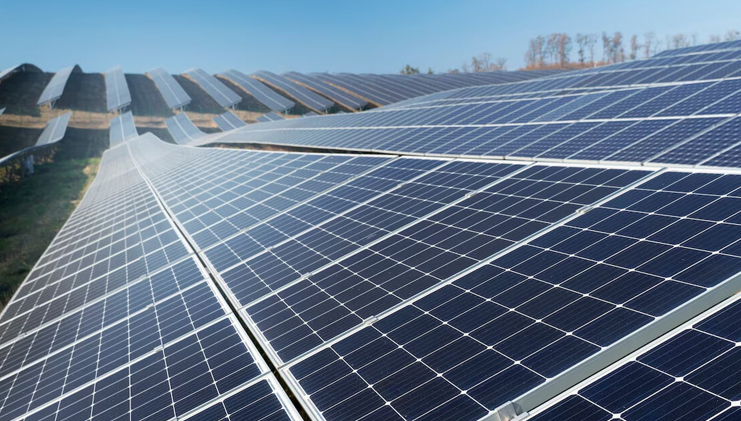
Do Solar Panels Save Money? Yes. Here's How
Lately, the cost of power has gone up a lot all around the country. In a place like India, which is still developing, it is truly vital to have power functions well all the time. This helps people and businesses in the growing and developing economy. So, it's really important to switch to ways of making energy that are dependable and save money.
Most Indians care very much about the amount they have to pay for things. That is the reason solar panels are an extraordinary decision for generating electricity for the home. But not many understand that getting solar panels help derive amazing ROI on the investment made.
To explain more, here are some reasons why having solar panels at home helps you save money:
1. Understanding the Initial Investment
A. Cost of Solar Panel Installation
The forthright expense of installing solar panels includes purchasing the equipment, paying for installation, and installing the panels. For houses that get lots of sunlight, it usually takes 6-8 years to make back the money spent on installation. The time it takes to recover the expense relies heavily on the amount you pay for power and how big your home is.
On average in India, installing a 3-kilowatt solar panel framework costs between INR 1,90,000 to 2,15,000. The expense per watt can go from INR 75 to 85. Before you sort out the amount it'll cost to install solar panels, look at your power bill. If your bill is high, installing solar panels could save you a large chunk of money over the long haul.
Electricity prices and how much power you use can change over time. So, the money you save using solar panels might go up or down. And if you start using more or less electricity, that'll also affect how much money you save.
Electricity prices and how much power you use can change over time. So, the money you save using solar panels might go up or down. And if you start using more or less electricity, that'll also affect how much money you save.
B. Factors Affecting Installation Costs
The cost of solar systems can vary a lot because of different reasons. It's crucial for people and businesses interested in installing solar panels to know what affects the prices. Let's check out the important things that impact the cost:
- Efficiency and type of solar panels
- Size of the system
- Type of inverter used
- How complicated it is to install and mount the panels
- The quality of all the parts
- Charges for installing everything
C. Government Subsidies and Incentives
In India, there's no free government plan for getting solar panels. But they did launch the Rooftop Solar Scheme or PM Surya Ghar Muft Bijli Yojana. The objectives is to install solar panels in people's houses and use more solar power at home.
Through this plan, the government gives money to help install solar panels. The amount varies from Rs. 30,000 to Rs. 78,000, based on how big the solar setup is. It's a way to promote using solar energy and make it more affordable for households.
2. Long-Term Savings
A. Reduction in Electricity Bills
Solar power can help businesses in India save money on energy. Solar power offers a solution as energy needs go up, and non-renewable energy costs rise. Businesses and houses can produce electricity using solar panels, reducing energy bills. It's a wise investment that pays off over time, keeping costs low for the long haul.
B. Return on Investment Calculation
The money you get back from installing solar panels depends on a few things. Think about these important factors:
- Inspection charges
- Installation costs
- Maintenance costs
- Efficiency
- Weather conditions
To sort out the amount you'll make from your solar panels over their lifetime, divide the total profit by what you originally paid for them. Then, multiply that number by 100. This will show you the estimated return on your investment as a percentage.
C. Potential Savings Over the Lifespan of Solar Panels
If your average monthly bill with solar panels is around Rs. 7,000, your overall bill will decrease to approximately Rs. 4,000 per month. Over 25 years, you could save more than Rs.12,25,000 on power bills with solar power. That is cash you get to keep instead of giving it to the electric company. Also, remember that utility rates normally go up by at least 5% every year. So, your solar savings will likely grow over time and shield you from higher rates.
3. Tax Benefits and Incentives
A. Tax Credits for Solar Panel Installation
You can get a good deal on taxes by installing solar panels. For three years, you can guarantee back 33% of what you spent on solar panels through a special tax rule called accelerated deterioration. Plus, there are exemptions from certain taxes on solar parts.
The government also offers subsidies to help cover installing solar panels. If you're putting them on smaller units, like homes or small offices, you can get a subsidy of 40% of the cost, and for larger units, you can get 20%. So, there are many ways to save money while helping the environment with solar power.
B. Accelerated Depreciation Benefits
Accelerated depreciation plays a major part in boosting investments in solar power projects in India. It's particularly great for organizations since it gives them depreciate investment in solar power plants quicker than they could with regular equipment.
If a solar plant runs for more than 180 days every year, it can get a 40% depreciation in the primary year and then another 20% after that. So, solar plant owners can depreciate up to 60% of their investment in the first year. This urges more individuals to invest in solar energy.
C. Other Financial Incentives Offered by Government
Other than the subsidy, there are additional advantages to setting up a solar system:
1. If you're placing in solar panels, you can get loans up to 10 lakhs from national banks. These credits are like home loans or home improvement credits.
2. You'll also earn rewards for generating power. You'll get Rs 2 for each unit of power you produce.
3. Plus, if someone has extra electricity, they can sell it. They'll get paid a fixed amount for each unit they sell, and the government's rules decide this amount on prices.
4. Maintenance and Operational Costs
A. Minimal Maintenance Requirements of Solar Panels
Like anything else, solar power systems need some maintenance, too. However, they possibly need a bit if they're set up well. Only a bit of cleaning once in a while to get rid of dirt and dust so the sun's rays can still reach the boards.
Also, it's critical to keep the electrical and electronic parts ventilated and cool by cleaning their ventilation regions. This helps them run smoothly and efficiently. So, while solar systems need a little care, it's not too much trouble to keep them working well.
B. Cost Savings Compared to Traditional Energy Sources
Once you set up solar power, it uses sunlight to make electricity without needing more fuel or much upkeep. Solar panels make a ton of energy all year, which helps bring down your power bills. Typically, it takes around 5 to 20 years for solar chargers to save you enough cash to take care of their expense.
Standard power bills keep coming every month, and they can change based on energy costs and the amount you use. Eventually, these bills can add up to more than what it costs to install a solar system.
C. Long-term durability and Reliability
Solar chargers can deal with extreme weather conditions like hail and weighty snow. They also last a long time, typically 25 years or more, and don't effortlessly break down. However, the entire solar setup's constancy can also depend on the quality of different parts like inverters and wiring, and factors like awful climate and shade can also influence it.
5. Environmental Impact and Cost Savings
A. Reduction in Carbon Footprint
Solar energy is perfect and makes your home effective and eco-friendly. When you use solar panels, you don't need to bother with any water or release unsafe gases into the air. Also, the sun, which powers solar panels, is free!
Using solar energy rather than ordinary power decreases hurtful carbon dioxide. Even a small solar system at home can have a major effect in diminishing your carbon impression and supporting renewable energy.
B. Environmental Benefits of Solar Energy
Solar power is perfect for our planet, especially for the environment. It helps by cutting down on harmful gases, making our air cleaner, and saving water. Using solar energy means we can rely less on things like coal and oil for power. This can also help lower energy costs in the long run.
C. Potential Cost Savings from Avoided Environmental Damages
Other than the environmental advantages, solar energy also brings large monetary benefits. There's a huge load of cash saved by not having to clean up pollution or manage the impacts of climate change. With these savings, communities can invest more in projects that promote long haul sustainability.
Conclusion
If you're paying a lot for power every month, particularly in an area where energy costs are high, it's a truly smart thought to consider getting solar panels for your home. With the 26% tax break accessible, it makes it even more worth the effort. Having solar panels saves you cash as well as helps the planet.

